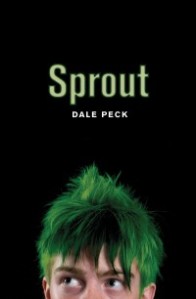Down to the Bone, by Mayra Lazara Dole (2008)

Laura Amores is a tortillera: a girl who loves girls.
In Down to the Bone, by Mayra Lazara Dole, Laura is a Cuban-American teen living in Miami. When her teacher (“Sister Fart Face”) reads aloud a letter from Laura’s girlfriend, Laura is abandoned by most of her friends, kicked out of her ultra-conservative high school, and banned from her home by her mother. Laura will only be allowed to come back home and see her younger brother if she changes and marries a man. Laura’s beloved girlfriend, Marlena, is forced to move back to Puerto Rico, where she decides to marry a man to appease her conservative Christian family. Laura has to decide between living a lie in order to regain her mother and brother, or being true to herself and possibly losing her family forever.
The characters in this book have one of two reactions when they find out that Laura is a tortillera: they are either fiercely supportive of her or violently opposed to her sexuality. When Laura is kicked out of her house, she goes to live with her best friend Soli and Soli’s mother: they are loving and nurturing, and encourage Laura to forget Marlena and date other girls. Laura also receives a lot of support from her new friend Tazer, who is “genderqueer” or a “boi” (that is, Tazer was born a girl but identifies as a boy; he does not want to undergo gender assignment surgery to become genetically male).
Many of Laura’s other close friends and family members abandon her when they find out she is gay. Her friends call her “revolting” and spit on her. Her teachers tell her she is immoral and deviant. She is nearly assaulted with a knife at work. Her mother has a strong negative reaction, and obviously believes that being gay is a sinful choice that Laura is making (2008, pp. 17, 27):
On our way home I try to reason with her: “Let me explain.”
She yanks my hair. “Explain? You’re a disgrace to our family name. If your father were alive, he’d die right now… I’ve never been so humiliated and embarrassed in all my life.”
…
Mami pushes me out the front door. I stumble and almost fall, but I don’t. “I’m sorry, Laura, but I can’t continue loving you if you stay gay.”
Laura’s love for her family and her desire for acceptance are so strong that she finds a boyfriend and considers marrying him. She cannot admit, even to herself, that she is a lesbian. Despite her difficult situation, Laura never loses her sense of humour and her fire. Her lively narration gives the reader a sense of what it is like to be a gay person in Cuban American culture.
Dole, M. L. (2008). Down to the Bone. HarperTeen.
ALA Booklist Top Ten First Novels for Youth
ALA Rainbow Books highly recommended title

